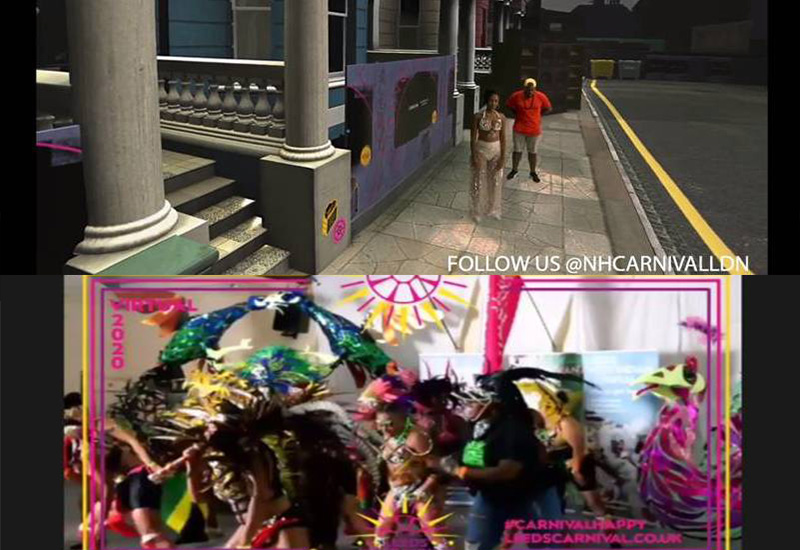By Debbie Ransome
Going beyond the basic storyline to dig deeper into the Haitian reality and how it gets reported, this

To the delight of Carnival fans in the Diaspora, Trinidad and Dominica just managed to get their feting done in February before the Covid-19 pandemic shut down the planet. That left many people wondering how other large-scale bacchanals would fare later in the year. As the virus continued to cast its shadow, they ended up being banished from the streets – but thanks to modern technology, the global party went on.
Started in the 1960s by homesick Trinis in west London, the Notting Hill Carnival has transcended its roots to become Europe’s biggest street festival. As anyone who has taken part in Trinidad carnival can see, its distant London cousin is now a long way from home. These days, it’s a multicultural street party that livens up the annual August Bank Holiday.
This writer brings another perspective to the comparison. London-born and Leeds-educated, I found my carnival maturity in Trinidad. And this year, I realised that the virtual carnival offerings in August 2020 offered a taste online of all the carnivals I’ve enjoyed over my life.
Despite all the difficulties, they did not fail to impress.
It’s hardly surprising that Notting Hill Carnival, with its sponsorship and time to plan during the pandemic lockdown, turned into a suave digital offering of performances (musical and visual) that reflected the mix of the London festival. Organisers even managed to tap into overseas Caribbean talent who couldn’t travel: on Carnival Monday evening, live soca performances with the Notting Hill brand were beamed in from an enticing Trinidad waterfront. The globe-trotting online offering culminated in a studio performance from Jamaica’s Shaggy.
I don’t know about others, but I reflected on Monday night that I would pay for this every year, whether there’s a street festival or not.
The Leeds Family
However, your bank holiday weekend enjoyment would have been short-changed if you hadn’t also visited the Leeds West Indian Carnival, which served up the best Zoom two-day meeting you’re ever going to attend.
On Sunday, cute youngsters, clearly bored with lockdown, put on their best glamour outfits to dance in front of their sofas. The Zoom window living-rooms were festooned with Caribbean island national flags (St Kitts being the most popular and testament to the large Kittitian community in Leeds). Equally hyperactive parents appeared on screen and then disappeared, while other grown-ups danced in their kitchens – all providing a sheer joy of community bonding on a digital platform.
On Carnival Monday, organisers provided a great soca soundtrack from local DJs as people jumped up at home with their bottles and flags. The action ran non-stop, from J’Ouvert first thing in the morning to some serious late afternoon adult jump-up activities, in people’s gardens and any grass areas available. In quieter moments, make-up and hair experts shared tips on Carnival glamour.
The digital plus
By lunchtime on Monday, it was clear that this strange new virtual world in which we live had allowed the Caribbean Diaspora to enjoy Carnivals 200 miles apart in Leeds and London before dropping in on the Trinis. On an attractive waterfront setting, soca stars Patrice Roberts, Olantunji and Iwer George performed.
Anyone going to a live carnival will know that there’s a cut-off point when the bands switch off the music, people finish their beers and all start to head home. However, the call by the Leeds DJ around 5.30pm on Bank Holiday Monday for the las’ lap (final jump-up) seemed to bring an even bigger frenzy of Zoom window performances. In the virtual world, nobody has to worry about how they’re getting home.
The growing sense of performing to a larger audience also began to dawn on mas’ (masquerade) band leaders and DJs being interviewed. As the two-day festivals progressed, they increasingly spiced up their appearances with “shout-outs” to Leeds, London and the wider world.
The London and Leeds virtual Carnivals felt like pilots for a type of carnival without boundaries. While they also provided plenty of sheer joy for any lover of carnival and, in fact, for anybody just fed up with lockdown, they also pointed to possible new add-ons to the live carnival format. We’ve all learnt the potential of digital connectivity during the pandemic lockdown, but this was an example of the global Caribbean community taking their carnival joy and creativity to a new level.
It all bodes well for the future of carnival. Even when and if we can all travel and meet up again, there’s a lot to be said for the air miles saved, while the scene-setting joy of a Trini soca concert could easily become a permanent part of the Notting Hill offer.
The UK carnival community did themselves proud during the end-of-August activities. Now it’s time to hand the baton to New York and, possibly, back to the Caribbean in early 2021.
By Debbie Ransome
Going beyond the basic storyline to dig deeper into the Haitian reality and how it gets reported, this
[photo: Patti Smith & Winston Rodney, cred Ted Bafaloukos]
In a year of global challenges and fall-out, we at Caribbean Intelligence© have focused on the aspirational side of Caribbean life.